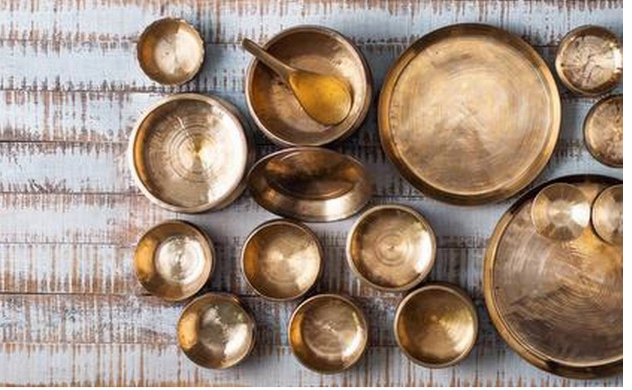The Indian kitchen has been blessed with an immense wealth of nutrition and health that doesn’t just come from food prepared as per traditional recipes alone. The ingredients used and preparation of food aside, the utensils used to cook and serve Indian food play an important role and are key to the age-old Indian food science. Thus, Indian kitchens traditionally utilize different metal utensils for cooking, storing, and eating food. Among these, Kansa utensils have had a prominent place and have been used for centuries, though the practice has declined over the past decades.
Kansa or Bronze, as it’s known in the west, is an alloy of copper and tin (in the ratio 4:1) producing pure bronze that is used for a variety of purposes, including use as utensils. Although Kansa is not ideal for the purpose of cooking, however, Ayurveda still recommends eating from Kansa Utensils. According to Ayurveda, Kansa possesses medicinal properties that can heal our body, cure certain illnesses and offer several therapeutic benefits to maintain a healthy life.
The deep connection between Kansa and Ayurveda
Kansa Kitchenware has been used since the period of Samhita Kala and is virtually as old as Ayurveda itself. Both ancient science and traditional practice were born in the same age – the Bronze age of human history when the metal alloy was first created. In India, the Harappan civilization in the Indus Valley was the first to create Kansa, the civilization was also the same place where Ayurveda was born. Kansa utensils were popularly used during the age and subsequently for eating and storing food. However, the common root they share is not the actual reason why Ayurveda prescribes the use of Kansa.
The science behind the use of Kansa
Our body requires several metals and minerals that each play a hundred important functions in our bodies. Metals are essential to activate enzymes in our body and play several other important roles as well. These metals, which are essential minerals in metal form, are derived from food or plant-based sources. However, food is not the only source of acquiring essential and major minerals. They can also be absorbed by the food or liquids from the utensils they are cooked, stored, or eaten in, in the form of traces.
Copper is an essential metal for our body, and the learned physicians of Ayurveda found Kansa to be an excellent as well as safe source of copper. Although pure copper utensils can also be used, they are highly reactive and are therefore not ideal for cooking, storing, and serving all kinds of food. However, Kansa being an alloy is safe. Eating in Kansa Utensils helps to replenish the stores of copper mineral in the body that is required for the healthy functioning of the body and prevention of diseases. And so, utensils such as Kansa Dinner Plate, Kansa Serving bowl, and spoons were always found in Indian homes.
Kansa – the key to holistic healing and healthy living
Bronze or Kansa is nothing short of gold to our body. Copper contained in Kansa is very precious to our bodies.
Kansa contains 70-80% copper, is a pH balancing metal that alkalizes food stored in it along with infusing it with qualities of copper. Ayurveda recommends eating and drinking from alkalizing metals as they help reduce the acid content of food, making it more digestible. Eating from Kansa utensils contributes to gut health by enhancing the absorption and digestion of food.
Kansa is also known to possess purifying and germicidal properties that, depending on the pathogen, kills germs and bacterias in food over a duration of time, aiding natural immunity.
In Ayurvedic treatments, Kansa is specifically used as it helps to settle tridoshas in the body, especially vaat that manifests as nervous temperament and irritability by removing toxins, relieving stress, and boosting energy levels. It is known to possess anti-inflammatory properties that help fight diseases. Copper in Kansa also promotes the formation of red blood cells, helps in the regulation of hemoglobin, maintaining thyroid function and cardiovascular health.
Kansa stimulates brain function and bolsters the nervous system. In fact, there is a Sanskrit phrase “Kaansyam Budhhivardhakam” mentioned in Ayurveda Prakash that throws light on the intellect-enhancing properties of Kansa. For its anti-convulsive characteristics, some studies are also being conducted on Kansa as a potential therapeutic cure in certain treatment modalities for ADHD in children.
Conclusion
The traditional use of Kansa in our kitchen is indeed a gift given to us by ancient Ayurveda, handed down from generation to generation in families. The ancient knowledge and science behind the use of Kansa utensils give us plenty of reasons to bring Kansa back into our kitchens. So why not take a few steps towards healthy living, start eating from a Kansa Dinner Plate and Kansa Serving bowl each day and make our lifestyle whole again?!


